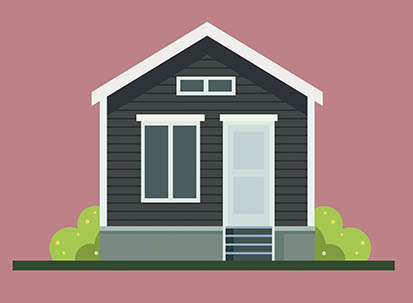You have a little savings, solid income and a super-irritating landlord, so the time feels right to make your move. Buying a home will bump up your monthly housing costs, use up most of your cash and tie you down. Are you ready for all that? Here’s how to make the rent vs. buy decision.
The Money Side of the Equation
It’s pretty simple: You are ready to buy a home when you’re earning enough money to make the purchase, stash some cash in savings and cover your housing expenses and any other debt.
Ready for a little math? Let’s get it:
The Assets You Need
You can get into a home with as little as 3 percent down with a conventional loan, or even less with down payment assistance programs. If you are a veteran or buying in a rural area, you may even get in with zero percent down. But you still need enough left over for closing costs and some reserves after you close. Figure that you need the down payment, closing costs of 1 to 3 percent of the purchase price and three times your proposed housing payment in the bank.
The Income to Pay
Lenders examine your debt-to-income ratio (DTI), or the ratio of your total monthly housing expense (principal, interest, taxes, insurance and mortgage insurance and HOA dues, plus other monthly payments on credit cards, car loans, etc.) to your gross income. To own, you should be making a gross income of two to four times the amount of the total housing payment. That’s a large spread, so let’s examine.
If you have a full-time job and a solid employer, manage your credit well and will still have decent savings after you close on a home, you can probably comfortably commit half of your gross income to your housing payment. (You may not want to go that high, but you fit the profile of those who rarely default, even with high monthly payments.)
If you work on commission, carry credit card balances every month and have just enough to qualify for the loan and close on a home, a large monthly mortgage payment might crush you if something like a car breakdown, medical emergency or job loss were to happen. You can probably get approved for a loan with a 43 percent debt-to-income ratio, but, man, are you sure? You are better off waiting or shopping for homes that would result in a monthly payment that’s 25 to 33 percent of your gross income.
The Other Half: Your Mindset
Being financially ready to buy a home is not the same as being mentally ready, because buying a home changes your life. Ownership means you can hammer nails wherever you like (just don’t hit a pipe) and X out the grouchy landlord who can kick you out. You control your monthly payment and stand to make some serious money when the time comes to sell. Yeah, big perks. But you have to be willing to give up a bit. Consider carefully before you commit.
The Need for Freedom
If living on the fly excites you and the thought of putting down roots sounds like a big snooze, you might not be emotionally ready to buy a home. Continue to rent and build a nest egg you can use to make a home purchase when the time is right.
Living Like a Boss
Tropical vacas, dinners out, shopping sprees: Can you live low key for a few years or would you shrivel without a few splurges? Consider your current lifestyle and what, if anything, you’re willing to cut out of your budget to own a home.
No Landlord on Speed Dial
When you own a home, it’s all on you. You will be pushing the lawn mower on Saturday mornings, calling the roofer when the ceiling leaks and reviewing estimates when the furnace breaks down. Are you ready for that kind of responsibility? If you’re ready for the work, you’re ready for a home.
 Facebook
Facebook
 X
X
 Pinterest
Pinterest
 Copy Link
Copy Link
